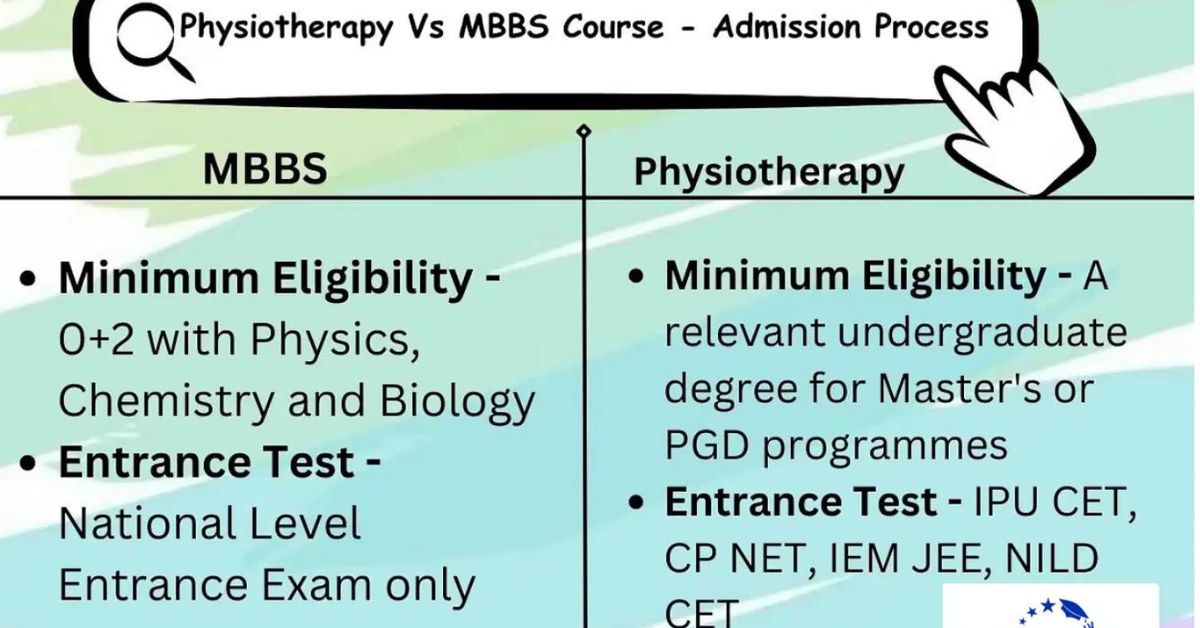
In the world of healthcare, choosing the right career path is a critical decision, and two prominent options are Physiotherapy and MBBS (Bachelor of Medicine, Bachelor of Surgery).
Physiotherapy vs MBBS
| Feature | MBBS | Physiotherapy (BPT) |
|---|---|---|
| Full Form | Bachelor of Medicine, Bachelor of Surgery | Bachelor of Physiotherapy |
| Duration | 5.5 years | 4.5 years |
| Focus | Medical diagnosis, treatment, surgery | Physical therapy, rehabilitation |
| Career Opportunities | Medical doctor, surgeon | Physiotherapist, rehabilitation specialist |
| Entrance Exam | NEET-UG | Various entrance exams or merit-based |
| Cost | ₹25,000 – ₹35 lakh per annum | ₹6,500 – ₹25 lakh per annum |
Earning an MBBS degree is more demanding, requiring students to clear competitive exams like NEET (in India) or the MCAT (in the U.S.)
Skip NEET India’s top physiotherapy program at the Institute of Health Science. Trained at Margdarsi Foundation and secure global placements—even NASA!
Career Scope
- MBBS:
- Opportunities: High demand for doctors in hospitals, clinics, and private practices.
- Job Outlook: Competitive, with significant opportunities for specialization and advancement1.
- Physiotherapy:
- Opportunities: Growing demand in hospitals, sports clinics, rehabilitation centers, and fitness centers.
- Job Outlook: Increasing need for physiotherapists due to rising physical health awareness and rehabilitation.
Physiotherapy vs MBBS Salary
- MBBS:
- Starting Salary: ₹6-12 lakh per annum.
- Mid-Level Salary: ₹12-30 lakh per annum.
- Experienced Salary: ₹30 lakh and above per annum, depending on specialization and experience.
- BPT:
- Starting Salary: ₹3-5 lakh per annum.
- Mid-Level Salary: ₹5-10 lakh per annum.
- Experienced Salary: ₹10 lakh and above per annum, depending on specialization and experience.
Physiotherapy Articles:
How to Enroll in a BPT Course 2024?
Want BASLP & BPT Admission? Crack IMAT 2024
Visit to read our latest blog articles: https://ihs.ac.in/blog/
Overview of Physiotherapy
1. History and Development of Physiotherapy
Physiotherapy has its roots in ancient Greece, where techniques like massage and hydrotherapy were used. Modern physiotherapy evolved during World War I when soldiers needed rehabilitation for injuries sustained during combat.
2. Role of a Physiotherapist
A physiotherapist assesses physical impairments, designs personalized treatment plans, and guides patients through exercises that help restore movement. Their expertise is essential in rehabilitation post-surgery or injury, chronic pain management, and improving quality of life for those with mobility issues.
3. Techniques Used in Physiotherapy
Common physiotherapy techniques include manual therapy (hands-on techniques like massage or joint manipulation), exercise therapy, and the use of specialized equipment like ultrasound machines and electrical stimulation for pain relief.
4. Common Conditions Treated by Physiotherapists
Physiotherapists treat a wide variety of conditions, including musculoskeletal issues like back pain, neurological disorders such as stroke rehabilitation, sports injuries, and post-operative recovery.
Overview of MBBS
1. History and Evolution of MBBS
The MBBS degree has a long history, with its origins in European medical schools. Over the centuries, it has become the global standard for medical education, providing a comprehensive foundation in both medicine and surgery.
2. Role of a Medical Doctor
Medical doctors are trained to diagnose and treat diseases, perform surgeries, and manage chronic conditions. Their role is vital in emergency care, routine health checkups, and preventive medicine.
3. Specializations Available for MBBS Graduates
After completing MBBS, doctors can choose to specialize in fields such as pediatrics, dermatology, cardiology, and surgery, among others. This allows them to focus on a specific area of medicine.
4. Common Diseases Managed by Doctors
Doctors manage a wide range of health conditions, from infectious diseases like the flu to chronic conditions like diabetes, heart disease, and cancer. Their role in disease prevention and public health is equally significant.
Physiotherapy vs MBBS Syllabus:
- Duration: 5.5 years (4.5 years of academic study + 1 year of internship).
- Core Subjects:
- Anatomy
- Physiology
- Biochemistry
- Pharmacology
- Pathology
- Microbiology
- Forensic Medicine
- Community Medicine
- Ophthalmology
- ENT (Ear, Nose, Throat)
- General Medicine
- General Surgery
- Obstetrics and Gynecology
- Pediatrics
- Orthopedics
- Psychiatry
- Dermatology
- Radiology
BPT Syllabus:
- Duration: 4.5 years (4 years of academic study + 6 months of internship).
- Core Subjects:
- Human Anatomy
- Physiology
- Biochemistry
- Kinesiology
- Exercise Therapy
- Electrotherapy
- Orthopedics and Traumatology
- Neurology (including Pediatrics & Psychiatry)
- General Medicine
- General Surgery
- Physiotherapy in Cardio-Respiratory Conditions
- Physiotherapy in Neurological Conditions
- Physiotherapy in Orthopedic Conditions
- Community-Based Rehabilitation
Is a Physiotherapist a Doctor?
No, physiotherapists are not medical doctors. They are healthcare professionals specializing in physical therapy and rehabilitation.
They cannot use the title “Dr.” unless they have completed a doctoral program in physiotherapy.
Is MBBS Necessary for Physiotherapy?
No, an MBBS degree is not necessary for pursuing a career in physiotherapy.
To become a physiotherapist, one needs to complete a Bachelor of Physiotherapy (BPT) program, which does not require an MBBS degree.
MBBS Full Form
The full form of MBBS is Bachelor of Medicine, Bachelor of Surgery.
The abbreviation is derived from the Latin term “Medicinae Baccalaureus, Baccalaureus Chirurgiae”.
FAQs
Can a physiotherapist be called a doctor?
No, physiotherapists are not medical doctors. They are healthcare professionals specializing in physical therapy and rehabilitation.
Is NEET required for physiotherapy?
No, NEET is not required for physiotherapy. Admissions can be based on other entrance exams or merit.
Which is better, MBBS or Physiotherapy?
It depends on your interests and career goals. If you are passionate about diagnosing and treating a wide range of medical conditions, MBBS might be the right choice. If you are interested in helping patients recover through physical therapy, then physiotherapy could be a better fit.
Choosing the right path depends on your interests, career goals, and the kind of work you see yourself enjoying in the long term. If you have any more questions or need further guidance, feel free to ask!

